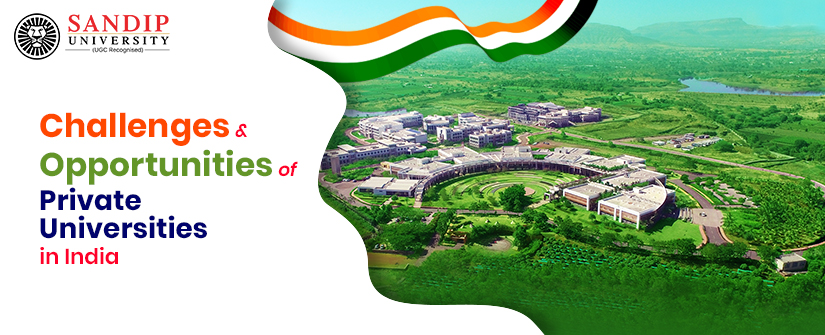Due to globalisation, liberalisation and privatisation, the role of Indian universities have been changing very rapidly. In India, many universities have to obey the rules and regulations formed by UGC. As of 25 November 2022, the UGC has listed 430 private universities in India.
Private universities in India are playing a pivotal role in providing quality education in the field of higher technical education. If you see the global scenario, you will come to realise that nearly 75% of Brazilian students prefer private universities. Japan and Korea have over 70% of students enrolled in private universities.
There are many top private universities in India that are dedicated towards providing students with quality education that is in sync with global standards. Such universities go a long way in improving the quality of their infrastructure, maintaining industry-relevant curriculum, providing 100% placement assistance through annual recruitment drives, and enhancing soft skills through extracurricular activities.
Let’s take a look at the opportunities and challenges faced by private universities in India:
Opportunities for Private Universities in India
1. Private universities can give maximum exposure to the students by internship in various concerned disciplines.
2. By updating their curriculum as per the latest advancement in the concerned course.
3. Through mini projects students can get real life exposure to the corporate and industrial world.
4. Continuous assessment of the students can be done through appointing a mentor for a group. It can aid in solving students’ problems quickly and effectively.
5. Experts from other universities, institutes like IITs, NITs, IIMs, IISCs can be called to expose the latest technology in the respective course.
6. Group discussion, seminars, field visits, project work can be organised to give an impetus to the teaching learning process.
7. Career oriented programs can be designed to bridge the gap between industry and academics.
8. Tie up with industries can be possible by integrated efforts of the university and the concerned industry. By developing I-I-I cells i.e. Industry Institute Internship cells in the campus; they can offer great employment opportunities to their enrolled students.
9. They can collaborate with the foreign universities to give maximum global exposure to the students.
10. Teaching quality can be improved because in the private sector everything is outcome based. Teachers have to endeavour to improve the quality of teaching; otherwise employers can fire them anytime.
11. Self-financed universities can provide world class facilities and faculties due to adequate funds.
12. Faculties can be trained which can produce more research output and patents.
13. They can focus on the outcome rather than the procedure.
14. India is emerging as a global hub in the education field. Foreign universities are also interested in investing their money in India in the educational field.
15. According to the FICCI-E and Y report, to achieve 30% Gross Enrolment Ratio (GER) over the next decade the country would need an additional capacity to cater to 25 million new seats. In India we have a low GER of 15% in higher education compared to 84% in the USA. So there is a great opportunity in the field of higher education.
Challenges of Private Universities in India
1.Lack of skilled manpower- Private universities find it difficult to attract skilled and trained manpower. Government aided universities get ample funds from the state as well as central government to pay the salary of the teachers as per the norm. Self-financed universities have to pay the salary of the teachers on their own. They have to manage with the limited funds.
2. High cost- In government-aided institutes and universities, students get admission with a minimum amount. They also get different types of scholarships from the government. Financially students can’t pay the high fees of private universities.
3. Poor regulation- As per the survey of NAAC (National Assessment and Accreditation Council only 27 universities and 715 colleges were accredited as on 29 March 2016 in Maharashtra.
4. Approvals- Multiple authorities such as AICTE and UGC create barriers in the approval process. The approval committee, the licensing process is totally based on physical infrastructure.
5. Lack of awareness about private universities among people- Students are not aware about private universities. They feel insecure about the authenticity of the degree. Students calculate the money they spend and the outcome they will get in the future. It is taken for granted that private institutes are typically driven by a profit motive. However, the Supreme Court has ordered such institutes to be charitable rather than profitable. If more profit is to be generated, it should be utilised for its expansion in infrastructure and overall development.
6. High barriers for a new player- It is a herculean task to get permission from different government authorities for starting a private university. It takes a lot of time for the approval procedure.
7. Focus on government institutions- The IITs, IIMs, national institutes and state colleges get the best students because of their infrastructure, reputation, quality of faculties and low costs. Self-financing institutions do not get such quality students. They have to strive hard to train average students into skilled manpower.
These are some of the opportunities and challenges faced by some of the best private universities in India. As a developing country, India still has a long way to go when it comes to creating top-notch private universities that comply with global standards. However, there are some emerging universities in India, especially in Maharashtra, that are making waves in terms of the quality of education they offer.
So make sure to conduct some research in which university will be best for your career goals. It is wise to seek admission in UGC-recognised universities as they comply with a set standard of education as per the guidelines of the UGC. Remember to take into consideration your financial situation and the return on investment that a good education can provide in the long run. Good luck!

